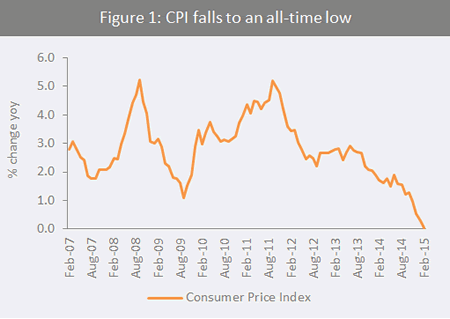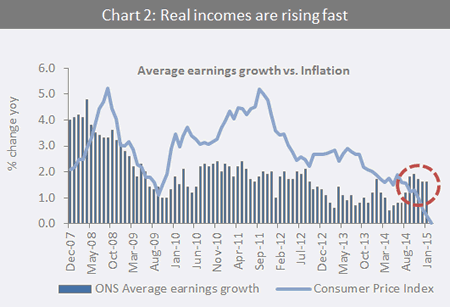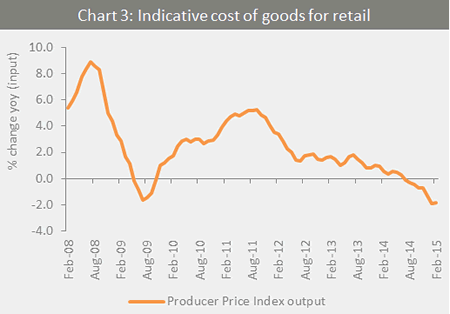UK on the verge of deflation
The UK is on the verge of deflation with the latest data reporting the Consumer Price Index (CPI) falling to zero in February. As we have indicated in previous reports we believe a brief period of deflation will be beneficial to the retail sector and the wider UK economy and will strong growth in real wages to feed through into the consumer sector.The fall in the headline rate from 0.3% to zero took inflation to a new record low - the lowest since 1989 in the current series. Downward pressure on prices were felt most from furniture, petrol and gas prices, while the impact of the supermarket price wars saw food prices fall by 3.3% over the last 12 months - setting another record low. Figure 1: CPI falls to an all-time low

Source: ONSWe expect deflation will emerge in March's figures as the impact of weaker oil prices continue to feed through the supply chain. In particular the impact of broad discounting in the domestic energy market will begin to be felt.Chart 2: Real incomes are rising fast

Source: ONSWhile inflation has fallen sharply nominal wage growth has picked up putting more money in households' pockets and boosting disposable incomes. Real incomes have now risen for six consecutive months.So with inflation falling and wage growth picking up we expect real household incomes to rise by 3.0% in 2015, in comparison with average growth of just 0.8% in the past two years. This will deliver solid growth in consumer spending of c.3.5% in 2015. The main components driving down inflation are from transport energy costs and food - areas which are relatively price insensitive. After all most people are unlikely to choose to drive a longer way to work or eat more during lunch as prices for these products fall. Therefore households will see a tangible boost in disposable incomes as prices across non-discretionary items fall and wages continue to rise. Providing households do not decide to increase levels of saving by the same amount, consumer spending will rise. While the grocery sector is facing its own set of unique challenges, the non-food sector is likely to benefit from this boost in household spending power. Sectors which are particularly income sensitive such as consumer electricals and home are likely to see the largest benefits. The Bank of England will be keeping a close eye on the wage growth but the latest data suggests pay settlements are holding up well. The latest IDS settlement figures show that median pay has picked up to around 2.5%. It would be a concern if businesses saw a period of deflation as an opportunity to award lower pay increases however after five years of persistent low wage rises we do not believe this to be the most likely outcome.Chart 3: Indicative cost of goods for retail

Source: ONSThe Producer Price Index for outputs indicative of costs faced by retailers for the goods they purchase remained in deflationary territory, although marginally slowed from 1.9% to 1.8%. However this was the eighth consecutive month to show deflation and the trend looks firmly on the downside.
Back to Retail Economic News